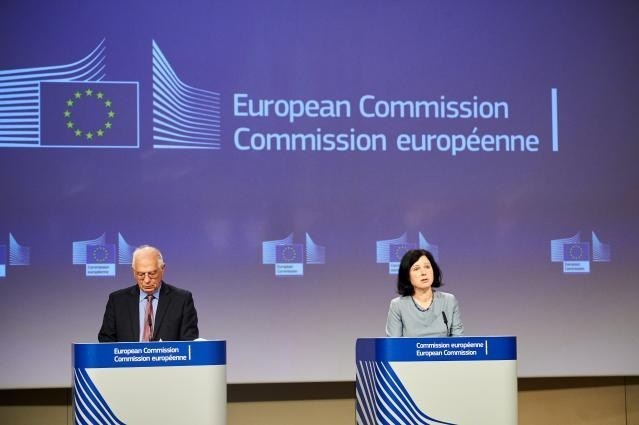The coronavirus pandemic has been accompanied by a massive wave of false or misleading information, including attempts by foreign actors to influence EU citizens and debates, according to the European Commission.
To counter the disinformation, the Commission published on Wednesday (10 June) a joint communication to the other EU institutions: “Tackling COVID-19 disinformation - Getting the facts right”. The communication analyses the immediate response and proposes concrete action that can be quickly set in motion.
In a non-exhaustive list of examples, the communication lists different types of disinformation during the corona virus crisis, such as misleading healthcare information, conspiracy theories that may endanger human health and lead to public violence, Illegal hate speech blaming a particular ethnic or religious group for the spread of COVID-19, consumer fraud and cybercrime.
“Disinformation in times of the coronavirus can kill. We have a duty to protect our citizens by making them aware of false information, and expose the actors responsible for engaging in such practices,” said High Representative/Vice-President Josep Borrell at a press conference.
“Disinformation waves have hit Europe during the Coronavirus pandemic. They originated from within as well as outside the EU. To fight disinformation, we need to mobilise all relevant players from online platforms to public authorities, and support independent fact checkers and media,” added Vera Jourova, Vice-President for Values and Transparency.
According to the communication, foreign actors and certain third countries, in particular Russia and China, have engaged in targeted influence operations and disinformation campaigns in the EU, its neighbourhood, and globally.
At the press conference, Borrell and Jourova declined to blame any other countries. The Commission cannot take stronger actions against the countries behind the disinformation - besides providing counter-information and facts - since they are denying that the disinformation is spread by public bodies.
Jourova was more bluntly on Hungary that this week launched a public consultation with a number of questions to its citizens on their opinion of different measures in case of a second wave of the coronavirus pandemic. Asked whether the consultation could be considered as disinformation, she replied that she did not have the questionnaire in front of her.
However, she said, a question claiming that “Brussels is preparing an offensive against the immigration-related regulations of the Hungarian constitution” would be fake news. She added that there was a similar case in the past when the Commission did react and provided the facts. “Maybe we’ll do it again.”
Jourova was referring to the anti-migration campaign that the Hungarian government launched on billboards and newspaper advertisements ahead of the European Parliament elections in May 2019. Then the Commission decided to react and issued a point by point fact sheet against the Hungarian claims.
The East Stratcom Task Force at the European External Action Service (EEAS) has detected and exposed more than 550 disinformation narratives from pro-Kremlin sources. The Task force was set up in 2015 to counter Russian disinformation but has a wider role today.
Despite limited resources, the task force is playing an important role during the corona crisis with a multiplying effect on the member states’ own efforts in tackling disinformation, according to Jourova.
Asked about president Trump’s tweets, she said that Twitter had handled them correctly by adding facts without removing them. Borrell said that democracy works on the basis of true information. “Acting in good faith and believing in fake news is no excuse.”
The crisis has become a test case showing how the EU and its democratic societies deal with the disinformation challenge. The communication underlines the need to distinguish between illegal content, such as hate speech and incitement to terrorism, and content that is harmful but not illegal. Unless disinformation causes “significant harm”, it cannot be banned.
The Commission is monitoring disinformation on online platforms under the Code of Practice on Disinformation from 2018. The code, a a self-regulatory tool to tackle disinformation, has been signed by Facebook, Google, Twitter, Mozilla and Microsoft as well as trade associations representing online platforms.
Jourova said the Commission will deliver an assessment of the code in the coming weeks and come up with a “balanced” proposal. Another code is the of Code of conduct on countering illegal hate speech online. The online companies that have signed it have committed themselves to remove hate speech within 24 hours.
M. Apelblat
The Brussels Times

